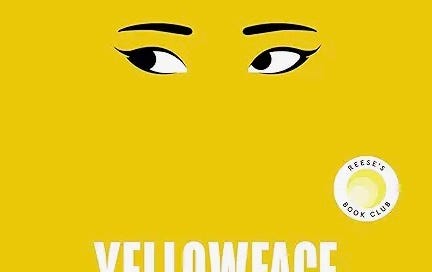BookLife Review by Carol O'Day: Yellowface (R.F. Kuang, author)
authorship, plagiarism, cultural appropriation, Chinese Labor Force, theft, diversity, racism, Asian American writer, first-person voice
June Heyward’s successful colleague, Athena Liu, dies suddenly and unexpectedly, in her apartment while June is visiting. After the ambulance departs, June takes a completed draft manuscript from her friend’s desk. Confident in Athena’s secretive and private writing habits, June edits the story, conducts additional research, changes some names, alters a few story lines and publishes it as her own under a new pseudonym, June Song (Song is her real middle name). June Heyward’s first novel was published, but was not successful. Athena has been a media sensation and best-selling writer. Take The Plot and stir in equal parts cultural appropriation and ambition and Yellowface rises like a well-proofed sourdough loaf.
Athena is Chinese-American. June is Caucasian. The historical fiction manuscript June takes from Athena’s desk is about Chinese Labor Forces deployed, mistreated and discriminated against during World War I. The book is a runaway hit and June’s profile skyrockets. June becomes obsessed with social media surrounding her own success, much as she had been about following Athena’s social media success previously.
Despite the success of the book, June Song is not without her critics. Before the book is initially published, an Asian editorial assistant at her publisher’s office suggests a cultural sensitivity read but and June rebuffs the idea. This assistant later privately posts a negative review of the book online. June has her fired. June begins a media tour when the book is released. During the book tour, her audience learns she is not Asian, and that she changed her name (from Heyward to Song) to suggest she might be. Social media fury mounts, as charges of racism, cultural appropriation arise. As attention grows, seeds of doubt about the book’s authorship arise. June denies them. Critical ghost social media accounts pop up. June hunts down her critics and maintains her denial and claims of innocence and outrage, sticking to her story of authorship.
It is of course, hard to like a thief, but Kuang works hard to blur the lines. First, Kuang writes in first-person, wedding the reader to June’s point of view. Second, June Heyward was a published writer before her sticky fingers lift her dead friend’s manuscript. Third, Athena had not submitted the manuscript for consideration, it was a draft, and ultimately we learn that Athena may have used dubious methods of her own in crafting the stories she did include. Fourth, June does invest significant work in the research, edit and rewrite. Nonetheless, June did not submit the work as a co-author and denies, over long periods of time, that Athena had any role in the work beyond discussion the story concept with June before her death.
The dual themes of intellectual property theft (authorship) and cultural appropriation at best (or racism at worst), drive the novel forward to its implosion and resolution. June’s past experiences, envy and need to be a writer ultimately direct her actions. Her deceit is her downfall, but her ability to re-write even the story of her downfall may allow her to live to see another day, or another book.




